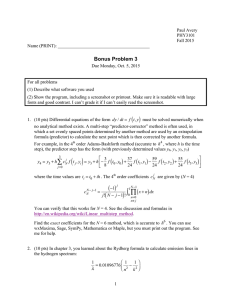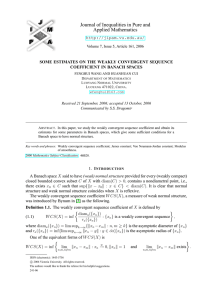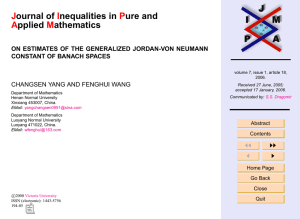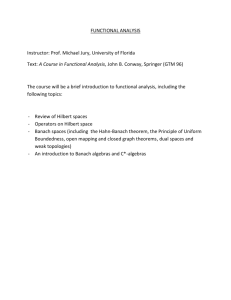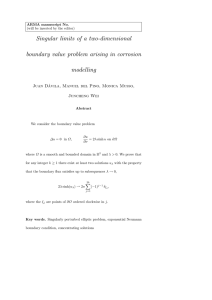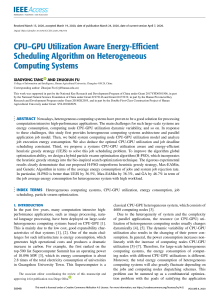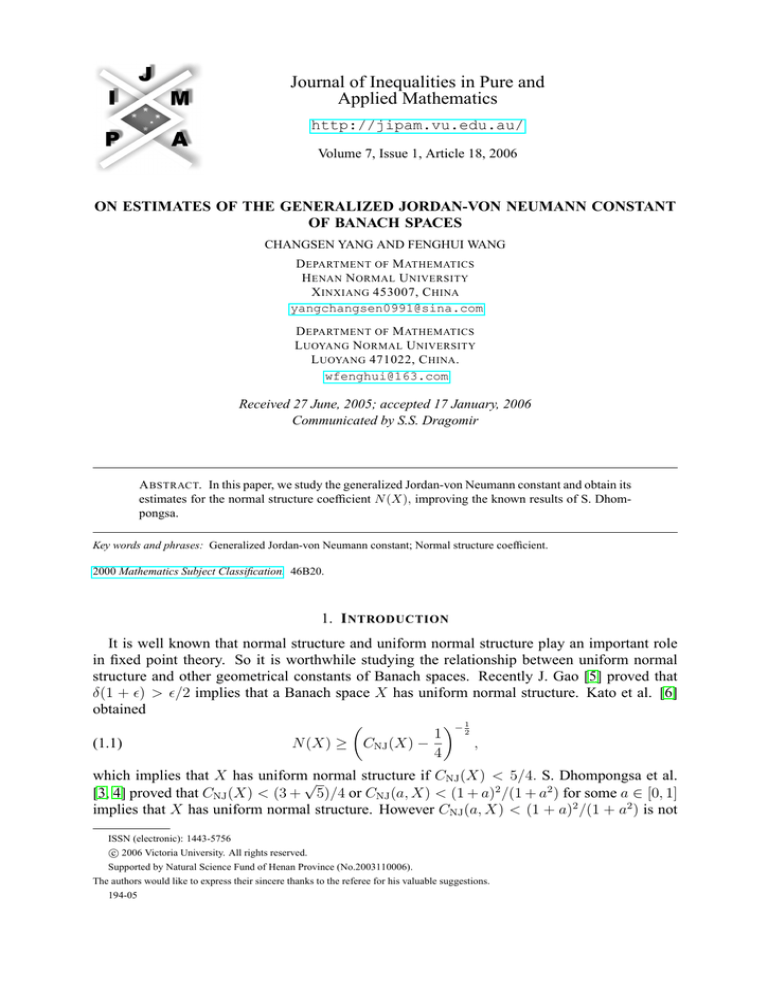
Journal of Inequalities in Pure and
Applied Mathematics
http://jipam.vu.edu.au/
Volume 7, Issue 1, Article 18, 2006
ON ESTIMATES OF THE GENERALIZED JORDAN-VON NEUMANN CONSTANT
OF BANACH SPACES
CHANGSEN YANG AND FENGHUI WANG
D EPARTMENT OF M ATHEMATICS
H ENAN N ORMAL U NIVERSITY
X INXIANG 453007, C HINA
yangchangsen0991@sina.com
D EPARTMENT OF M ATHEMATICS
L UOYANG N ORMAL U NIVERSITY
L UOYANG 471022, C HINA .
wfenghui@163.com
Received 27 June, 2005; accepted 17 January, 2006
Communicated by S.S. Dragomir
A BSTRACT. In this paper, we study the generalized Jordan-von Neumann constant and obtain its
estimates for the normal structure coefficient N (X), improving the known results of S. Dhompongsa.
Key words and phrases: Generalized Jordan-von Neumann constant; Normal structure coefficient.
2000 Mathematics Subject Classification. 46B20.
1. I NTRODUCTION
It is well known that normal structure and uniform normal structure play an important role
in fixed point theory. So it is worthwhile studying the relationship between uniform normal
structure and other geometrical constants of Banach spaces. Recently J. Gao [5] proved that
δ(1 + ) > /2 implies that a Banach space X has uniform normal structure. Kato et al. [6]
obtained
− 1
1 2
(1.1)
N (X) ≥ CNJ (X) −
,
4
which implies that X has uniform√normal structure if CNJ (X) < 5/4. S. Dhompongsa et al.
[3, 4] proved that CNJ (X) < (3 + 5)/4 or CNJ (a, X) < (1 + a)2 /(1 + a2 ) for some a ∈ [0, 1]
implies that X has uniform normal structure. However CNJ (a, X) < (1 + a)2 /(1 + a2 ) is not
ISSN (electronic): 1443-5756
c 2006 Victoria University. All rights reserved.
Supported by Natural Science Fund of Henan Province (No.2003110006).
The authors would like to express their sincere thanks to the referee for his valuable suggestions.
194-05
2
C HANGSEN YANG
AND
F ENGHUI WANG
a sharp condition for X to have uniform normal structure especially when a is close to 0. Our
aim is to improve the result of S. Dhompongsa.
We shall assume throughout this paper that X is a Banach space and X ∗ its dual space.
We will use SX to denote the unit sphere of X. A Banach space X is called non-trivial if
dim X ≥ 2. A Banach space X is called uniformly nonsquare if for any x, y ∈ SX there exists
δ > 0, such that either kx − yk/2 ≤ 1 − δ, or kx + yk/2 ≤ 1 − δ. Uniformly nonsquare
spaces are superreflexive. Let C be a nonempty bounded convex subset of X. The number
diam C = sup{kx − yk : x, y ∈ C} is called the diameter of C. The number r(C) =
inf{sup{kx − yk : x ∈ C} : y ∈ C} is called the Chebyshev radius of C. By Z(C) we will
denote the set of all x ∈ C at which this infimum is attained. It is called the Chebyshev center
of C. Bynum [2] introduced the following normal structure coefficient
N (X) = inf{diamC},
(1.2)
where the infimum is taken over all closed convex subsets C of X with r(C) = 1. Obviously
1 ≤ N (X) ≤ 2 and X is said to have uniform normal structure provided N (X) > 1. Moreover
if X is reflexive, then the infimum in the definition of N (X) may as well be taken over all convex hulls of finite subsets of X [1]. In connection with a famous work of Jordan-von Neumann
concerning inner products, the Jordan-von Neumann constant CNJ (X) of X was introduced by
Clarkson as the smallest constant C for which
1
kx + yk2 + kx − yk2
≤
≤C
C
2(kxk2 + kyk2 )
holds for all x, y with (x, y) 6= (0, 0). If C is the best possible in the right hand side of the above
inequality then so is 1/C on the left. Hence
kx + yk2 + kx − yk2
: x, y ∈ X not both zero .
(1.3)
CNJ (X) = sup
2(kxk2 + kyk2 )
The statements without explicit reference have been taken from Kato et al. [6]. In [3] S.
Dhompongsa generalized this definition in the following sense.
(1.4)
CNJ (a, X)
kx + yk2 + kx − zk2
= sup
: x, y, z ∈ X not all zero and ky − zk ≤ akxk
2kxk2 + kyk2 + kzk2
where a is a nonnegative parameter. Obviously, CNJ (X) = CNJ (0, X).
2. M AIN R ESULTS
Our proofs are based on an idea due to S. Prus [7]. Let C be a convex hull of a finite subset
of X. Since C is compact, there exists an element y ∈ C such that
sup kx − yk = r(C).
(2.1)
x∈C
Translating the set C we can assume that y = 0. The following result is [7, Theorem 2.1].
Proposition 2.1. Let C be a nonempty compact convex subset of a finite dimensional Banach
space X and x0 ∈ C. If x0 ∈ Z(C), then there exist elementsPx1 . . . , xn ∈ C, functionals
x∗1 , . . . , x∗n ∈ SX ∗ , and nonnegative scalars λ1 , . . . , λn such that ni=1 λi = 1,
x∗i (x0 − xi ) = kx0 − xi k = r(C)
J. Inequal. Pure and Appl. Math., 7(1) Art. 18, 2006
http://jipam.vu.edu.au/
O N E STIMATES OF THE G ENERALIZED J ORDAN - VON N EUMANN C ONSTANT OF BANACH S PACES
3
for i = 1, . . . , n and
n
X
λi x∗i (x − x0 ) ≥ 0
i=1
for every x ∈ C.
Theorem 2.2. Let X be a non-trivial Banach space with the normal structure constant N (X).
Then for each a, 0 ≤ a ≤ 1,
s
maxr∈[a,1] f (r)
(2.2)
N (X) ≥
,
CNJ (a, X)
where
f (r) =
(1 + r)2 + (1 + a)2
,
2(1 + r2 )
r ∈ [a, 1].
Proof.
Case 1: If CNJ (a, X) = 2, it suffices to note that
(1 + r)2 + (1 + a)2
(1 + r)2 + (1 + r)2
≤
max
≤ 2.
a≤r≤1
a≤r≤1
a≤r≤1
2(1 + r2 )
2(1 + r2 )
In this case our estimate is a trivial one.
Case 2: If CNJ (a, X) < 2, then X is uniformly nonsquare and therefore reflexive [3]. Now
let C be a convex hull of a finite subset of X such that r(C) = 1 and diam C = d. We
can assume that sup{kxk : x ∈ C} = 1 and by Proposition 2.1 we get elements
Pnx1 . . . , xn ,
∗
∗
norm-one functionals x1 , . . . , xn and nonnegative
P numbers λ1 , . . . , λn such that i=1 λi = 1,
x∗i (−xi ) = kxi k = 1 for i = 1, . . . , n and ni=1 λi x∗i (xj ) ≥ 0 for j = 1, . . . , n. For any
r ∈ [a, 1], let us set
max f (r) = max
xi − xj
r
(r − a)xi + axj
, yi,j = xi , zi,j =
for i, j = 1, . . . , n.
d
d
d
Obviously kxi,j k ≤ 1, kyi,j k ≤ r, kzi,j k ≤ r, and kyi,j − zi,j k = akxi,j k. It follows that
n
X
λi λj kxi,j + yi,j k2 + kxi,j − zi,j k2
xi,j =
i,j=1
≥
=
n
X
j=1
n
X
j=1
λj
λj
n
X
i=1
n
X
i=1
λi [x∗i (xi,j + yi,j )]2 +
n
X
i=1
λi
λi
n
X
λj [x∗j (xi,j − zi,j )]2
j=1
2 X
2
n
n
X
1+r 1 ∗
1+a 1+a−r ∗
+ xi (xj ) +
λj
λi
+
xj (xi )
d
d
d
d
j=1
i=1
n
n
n
n
X
X
(1 + r)2 2(1 + r) X X
∗
2
=
+
λj
λi xi (xj ) + (1/d )
λj
λi [x∗i (xj )]2
2
2
d
d
j=1
i=1
j=1
i=1
n
n
(1 + a)2 2(1 + a)(1 + a − r) X X
+
+
λi
λj x∗j (xi )
d2
d2
i=1
j=1
n
n
(1 + a − r)2 X X
+
λi
λj [x∗j (xi )]2
d2
i=1
j=1
≥
(1 + r)2 (1 + a)2
+
d2
d2
J. Inequal. Pure and Appl. Math., 7(1) Art. 18, 2006
for any r ∈ [a, 1].
http://jipam.vu.edu.au/
4
C HANGSEN YANG
AND
F ENGHUI WANG
Therefore there exist i, j such that
(1 + r)2 (1 + a)2
kxi,j + yi,j k + kxi,j − zi,j k ≥
+
.
d2
d2
From the definition of the generalized Jordan-von Neumann constant we obtain that
2
CNJ (a, X) ≥
2
(1 + r)2 + (1 + a)2
kxi,j + yi,j k2 + kxi,j − zi,j k2
≥
,
2kxi,j k2 + kyi,j k2 + kzi,j k2
2(1 + r2 )d2
which implies
s
maxr∈[a,1] f (r)
.
CNJ (a, X)
Since C is arbitrary, we obtain the desired estimate (2.2).
.
p
4 + (1 + a)4 − (1 + a)2
2. Then a ≤ r0 if
Lemma 2.3. Let 0 ≤ a ≤ 1 and r0 =
√
√
a ∈ 0, 2 − 1 and a ≥ r0 if a ∈
2 − 1, 1 .
√
Proof. If a ∈ [0, 2 − 1] then
d≥
4 + (1 + a)4 − [(1 + a)2 + 2a]2 = 4(1 − a − 3a2 − a3 )
√ √ = −4(a + 1) a + 1 + 2 a + 1 − 2
≥ 0,
p
which implies 4 + (1 + a)4 ≥ (1 + a)2 + 2a. Therefore
p
4 + (1 + a)4 − (1 + a)2
r0 − a =
− a ≥ 0.
2
√
√
Thus we obtain that r0 ≥ a if a ∈ [0, 2 − 1]. Similarly we get r0 ≤ a if a ∈ [ 2 − 1, 1].
Theorem 2.4. Let X be a non-trivial Banach space with the generalized Jordan-von Neumann
constant CNJ (a, X). If
p
h √
i
2 + (1 + a)2 + 4 + (1 + a)4
(2.3)
CNJ (a, X) <
for some a ∈ 0, 2 − 1 ,
4
or
h√
i
(1 + a)2
(2.4)
CNJ (a, X) <
for some a ∈
2 − 1, 1 ,
1 + a2
then X has uniform normal structure.
Proof. Let
p
4 + (1 + a)4 − (1 + a)2
(1 + r)2 + (1 + a)2
f (r) :=
,
r0 =
.
2(1 + r2 )
2
First we note that
on [0, r0 ], and decreasing on [r0 , 1].
f√(r) is increasing
Case 1: If a ∈ 0, 2 − 1 , then r0 ∈ [a, 1] by Lemma 2.3, which implies
p
2 + (1 + a)2 + 4 + (1 + a)4
max f (r) = f (r0 ) =
.
r∈[a,1]
4
By (2.2) and (2.3) we obtain that
s
maxr∈[a,1] f (r)
N (X) ≥
>1
CNJ (a, X)
J. Inequal. Pure and Appl. Math., 7(1) Art. 18, 2006
http://jipam.vu.edu.au/
O N E STIMATES OF THE G ENERALIZED J ORDAN - VON N EUMANN C ONSTANT OF BANACH S PACES
5
and hence X has√
uniform normal
structure.
Case 2: If a ∈
2 − 1, 1 , then r0 ≤ a by Lemma 2.3 and thus f (r) is decreasing on [a, 1],
which implies
(1 + a)2
max f (r) = f (a) =
.
r∈[a,1]
1 + a2
By (2.2) and (2.4) we obtain that
s
maxr∈[a,1] f (r)
N (X) ≥
>1
CNJ (a, X)
and hence X has uniform normal structure.
Note that
p
h √
2 + (1 + a)2 + 4 + (1 + a)4
(1 + a)2
>
for
all
a
∈
0,
2
−
1
.
4
1 + a2
Thus this gives a strong improvement of [3, Theorem 3.6] and [4, Corollary 3.8].
Corollary 2.5 ([3, Theorem 3.6]). X has uniform normal structure if CNJ (X) < (3 +
√
5)/4.
R EFERENCES
[1] D. AMIR, On Jung’s constant and related coefficients in normed linear spaces, Pacific. J. Math., 118
(1985), 1–15.
[2] W.L. BYNUM, Normal structure coefficients for Banach spaces, Pacific. J. Math., 86 (1980), 427–
436.
[3] S. DHOMPONGSA, P. PIRAISANGJUN AND S. SAEJUNG, Generalized Jordan-von Neumann
constants and uniform normal structure, Bull. Austral. Math. Soc., 67 (2003), 225–240.
[4] S. DHOMPONGSA, A. KAEWKHAO, AND S. TASENA, On a generalized James constant, J. Math.
Anal. Appl., 285 (2003), 419–435.
[5] J. GAO, Modulus of convexity in Banach spaces, Appl. Math. Lett., 16 (2003), 273–278.
[6] M. KATO, L. MALIGRANDA AND Y. TAKAHASHI, On James and Jordan-von Neumann constants and normal structure coefficient of Banach spaces, Studia Math., 144 (2001), 275–295.
[7] S. PRUS AND M. SZCZEPANIK, New coefficients related to uniform normal normal structure, J.
Nonlinear and Convex Anal., 2 (2001), 203–215.
J. Inequal. Pure and Appl. Math., 7(1) Art. 18, 2006
http://jipam.vu.edu.au/

